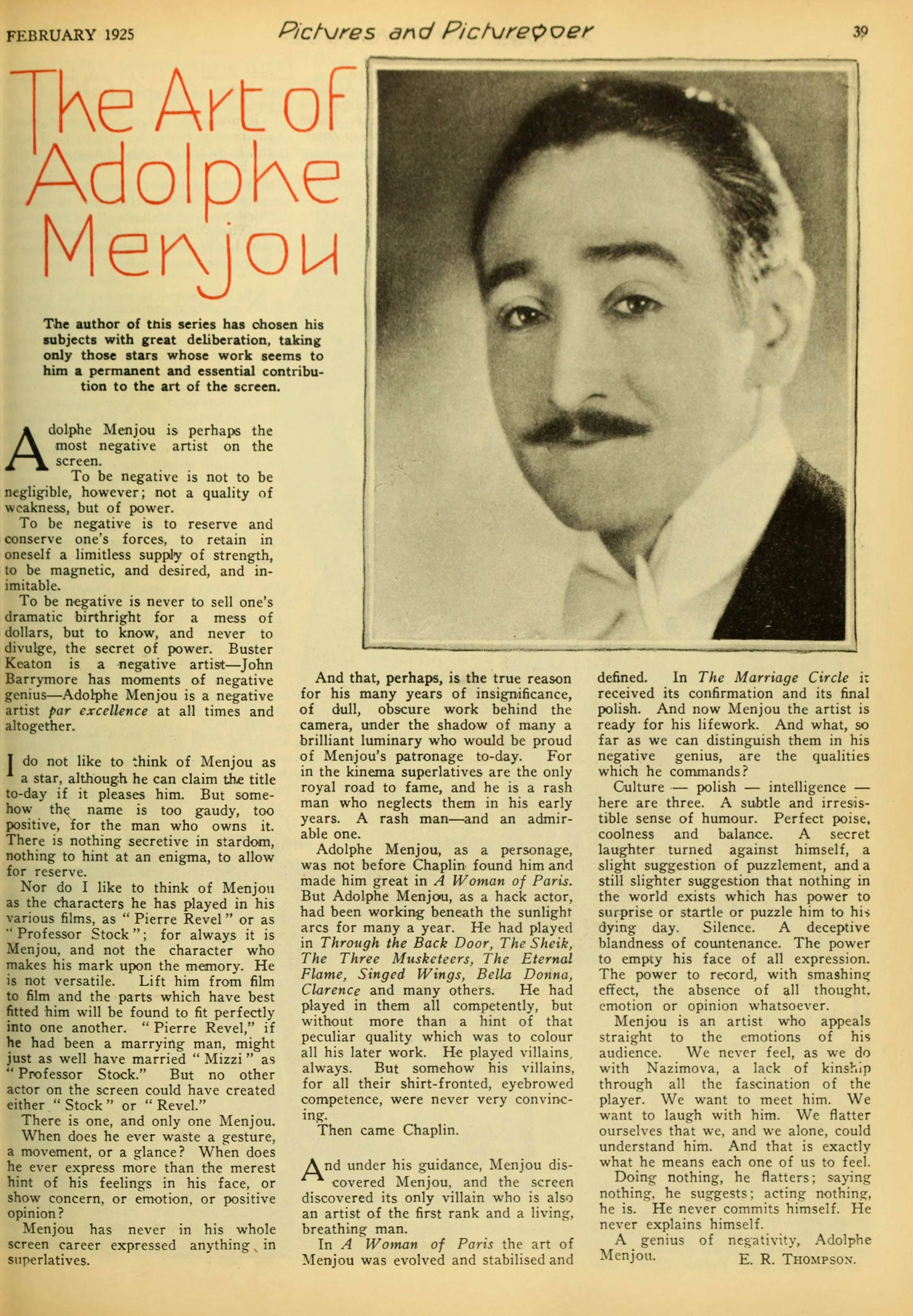The Art of Adolphe Menjou (1925) 🇬🇧

Adolphe Menjou is perhaps the most negative artist on the screen. To be negative is not to be negligible, however; not a quality of weakness, but of power.
by E. R. Thompson
To be negative is to reserve and conserve one’s forces, to retain in oneself a limitless supply of strength, to be magnetic, and desired, and inimitable.
To be negative is never to sell one’s dramatic birthright for a mess of dollars, but to know, and never to divulge, the secret of power. Buster Keaton is a negative artist — John Barrymore has moments of negative genius — Adolphe Menjou is a negative artist par excellence at all times and altogether.
I do not like to think of Menjou as a star, although he can claim the title to-day if it pleases him. But somehow the name is too gaudy, too positive, for the man who owns it. There is nothing secretive in stardom, nothing to hint at an enigma, to allow for reserve.
Nor do I like to think of Menjou as the characters he has played in his various films, as Pierre Revel or as Professor Stock; for always it is Menjou, and not the character who makes his mark upon the memory. He is not versatile. Lift him from film to film and the parts which have best fitted him will be found to fit perfectly into one another, Pierre Revel, if he had been a marrying man, might just as well have married Mizzi as Professor Stock. But no other actor on the screen could have created either Stock or Revel.
There is one, and only one Menjou.
When does he ever waste a gesture, a movement, or a glance? When does he ever express more than the merest hint of his feelings in his face, or show concern, or emotion, or positive opinion?
Menjou has never in his whole screen career expressed anything in superlatives.
And that, perhaps, is the true reason for his many years of insignificance, of dull, obscure work behind the camera, under the shadow of many a brilliant luminary who would be proud of Menjou’s patronage to-day. For in the kinema superlatives are the only royal road to fame, and he is a rash man who neglects them in his early years. A rash man — and an admirable one.
Adolphe Menjou, as a personage, was not before Chaplin [Charles Chaplin] found him and made him great in A Woman of Paris. But Adolphe Menjou, as a hack actor, had been working beneath the sunlight arcs for many a year. He had played in Through the Back Door, The Sheik, The Three Musketeers, The Eternal Flame, Singed Wings, Bella Donna, Clarence and many others. He had played in them all competently, but without more than a hint of that peculiar quality which was to colour all his later work. He played villains, always. But somehow his villains, for all their shirt-fronted, eyebrowed competence, were never very convincing.
Then came Chaplin.
And under his guidance, Menjou discovered Menjou, and the screen discovered its only villain who is also an artist of the first rank and a living, breathing man.
In A Woman of Paris the art of Menjou was evolved and stabilised and defined. In The Marriage Circle it received its confirmation and its final polish. And now Menjou the artist is ready for his lifework. And what, so far as we can distinguish them in his negative genius, are the qualities which he commands?
Culture — polish — intelligence — here are three. A subtle and irresistible sense of humour. Perfect poise, coolness and balance. A secret laughter turned against himself, a slight suggestion of puzzlement, and a still slighter suggestion that nothing in the world exists which has power to surprise or startle or puzzle him to his dying day. Silence. A deceptive blandness of countenance. The power to empty his face of all expression. The power to record, with smashing effect, the absence of all thought, emotion or opinion whatsoever.
Menjou is an artist who appeals straight to the emotions of his audience. We never feel, as we do with Nazimova, a lack of kinship through all the fascination of the player. We want to meet him. We want to laugh with him. We flatter ourselves that we, and we alone, could understand him. And that is exactly what he means each one of us to feel.
Doing nothing, he flatters; saying nothing, he suggests; acting nothing, he is. He never commits himself. He never explains himself.
A genius of negativity, Adolphe Menjou.

Collection: Picturegoer Magazine, February 1925
---
The Art of… series:
- 1925–01 — Alla Nazimova
- 1925–02 — Adolphe Menjou
- 1925–03 — John Barrymore
- 1925–04 — Charles Chaplin
- 1925–05 — Pola Negri
- 1925–06 — Douglas Fairbanks Sr.
- 1925–07 — Leatrice Joy
- 1925–08 — Bernhard Goetzke
- 1925–09 — Mary Pickford
- 1925–10 — Ernst Lubitsch
- 1925–12 — Ian Keith
